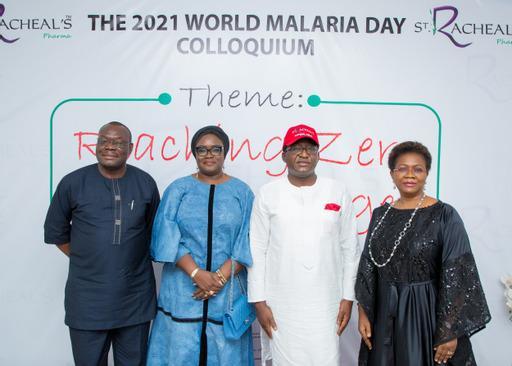-
As St. Racheal’s unveils Antimalarial Art Competition
For Nigeria to achieve zero malaria targets, speakers at St. Racheal’s World Malaria Day Colloquium, organized by the company recently, to mark the 2021 World Malaria Day, have tasked governments at all levels to increase funding for anti-malaria initiatives among other actionable resolutions.
The experts regretted that while Nigeria is still battling with lack of sustaining funds, sensitive field tests that can detect low levels of parasitemia and also global warming and climate change, four countries from Asia- China, Iran, Malaysia, and Timor-Letse and one from central America- El Salvador already have reported no indigenous cases of malaria in 2018, according to the World Health Organization, WHO.
They unanimously emphasise the need to optimize existing anti-malaria funds utilization, allocate 1% of 2022 – 2032 national and sub-national budget to anti-malaria initiatives and broaden access to micro-insurance especially to the economically and geographically disadvantaged.
Calling for more actions, the speakers said there should be increased private sector participation in anti-malaria programmes and initiatives and increased awareness of the citizenry on malaria prevention, testing, and treatment.
Other resolutions include: “Increase access to diagnostics (RTD) and procurement of safe, high quality, and affordable antimalarials and also develop national malaria database to address the paucity of data to drive targeted interventions.
Prof. Wellington Oyibo from the University of Lagos, while speaking on the topic: ‘Reaching the Zero Malaria Target in Nigeria- Is it Possible?’ explained the state of malaria globally.
He noted that despite that 7.6 million malaria deaths have been averted in the period of2000-2019, more needs to be done.
According to him, “World Malaria Report 2020 stated that 29 countries accounted for 95% of malaria cases globally. Nigeria (27%), the Democratic Republic of the Congo (12%), Uganda (5%), Mozambique (4%), and Niger (3%) accounted for about 51% of all cases globally.
“Globally, malaria deaths have reduced steadily over the period 2000-2019, from 736,000 in 2000 to 409,000 in 2019. The percentage of total malaria deaths among children aged under 5years was 84% in 2000 and 67% in 2019.
“Globally, an estimated 1.5 billion malaria cases and 7.6 million malaria deaths have been averted in the period 2000-2019. But we are not there yet,” Oyibo said.
In his remarks, the CEO of St.Racheal’s Pharma, Akinjide Adeosun, said the company’s twin objectives were to raise awareness about the morbidity and mortality of Malaria in Nigeria and espouse strategies at the private sector and public sector towards the eradication of malaria in Nigeria over the next 10 years.
In that lights and part of its contributions to eradicate malaria in Nigeria, the institution unveiled the St. Rachael Antimalaria Art Competition in secondary schools in Nigeria this quarter with the Star Prize of N250, 000:00. The initiative is to raise awareness amongst school children to drive long term community good anti-malaria practices.
Adeosun also said St Racheal would embark on free malaria medical missions to lighten health economic burden in indigent persons and bottom of pyramid communities; boost the technical capability of a Nigeria school of pharmacy through a local bioequivalence study for St Racheal’s antimalarial medicines.
However, Nigeria southwest states (Lagos, Oyo, Ogun, Ekiti) as presented in the event have demonstrated the strong political will to reach zero malaria target with clear strategies and robust programmes which show good signs of success.

